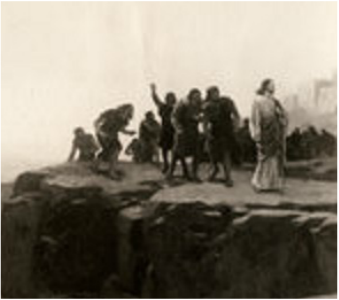
God's Word is the source of assurance, consolation, reconciliation, hope, and peace. In context, it is more typically problematic, running against the common grain. And that may be what it's supposed to do.
Of course, pushing against the common grain is fraught with reaction, often unpleasant as people don't like their boat being rocked. In fact, we tend to believe that God's Word is a reflection of our beliefs. Statements to the contrary invite bitter responses.
In the calling of Jeremiah, the (supposedly) young man responds to God's call with definite trepidation. God brushes aside such concerns and places God's Word in Jeremiah's mouth. The history of God's prophetic servants illustrates a dynamic of harsh conflict and ugly confrontation. No wonder Jeremiah would like a way out of this calling.
For Jesus, following his self-announcement as the Anointed One of God depicted by the prophet Isaiah, he gets a positive reaction form the hometown crowd. However, he understands their epxctations that whatever he had been doing on the way to Nazareth, like in Capernaum, would be replicated in spades for his hometown folks.
He cites instances of prophets in the past who minister not to the accepted, the hometown folks, but to the unaceptable, Gentile foreigners. The reaction is swift and negative.
Indeed, God's Word is problematic, and we should expect it to be so. When it's become oh so comfortable, we may be missing exactly what we need to hear. To find out more, check out the sermon videos and note the downloads below the video panel.
Of course, pushing against the common grain is fraught with reaction, often unpleasant as people don't like their boat being rocked. In fact, we tend to believe that God's Word is a reflection of our beliefs. Statements to the contrary invite bitter responses.
In the calling of Jeremiah, the (supposedly) young man responds to God's call with definite trepidation. God brushes aside such concerns and places God's Word in Jeremiah's mouth. The history of God's prophetic servants illustrates a dynamic of harsh conflict and ugly confrontation. No wonder Jeremiah would like a way out of this calling.
For Jesus, following his self-announcement as the Anointed One of God depicted by the prophet Isaiah, he gets a positive reaction form the hometown crowd. However, he understands their epxctations that whatever he had been doing on the way to Nazareth, like in Capernaum, would be replicated in spades for his hometown folks.
He cites instances of prophets in the past who minister not to the accepted, the hometown folks, but to the unaceptable, Gentile foreigners. The reaction is swift and negative.
Indeed, God's Word is problematic, and we should expect it to be so. When it's become oh so comfortable, we may be missing exactly what we need to hear. To find out more, check out the sermon videos and note the downloads below the video panel.
| 01-31-16-ff-answers.pdf |
| 01-31-16-gods_problematic_word.pdf |
